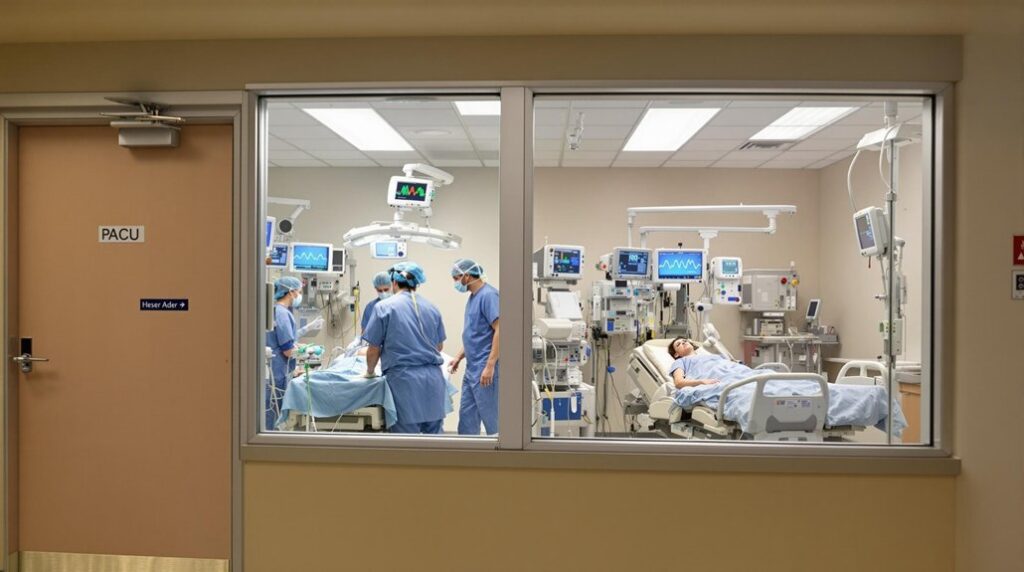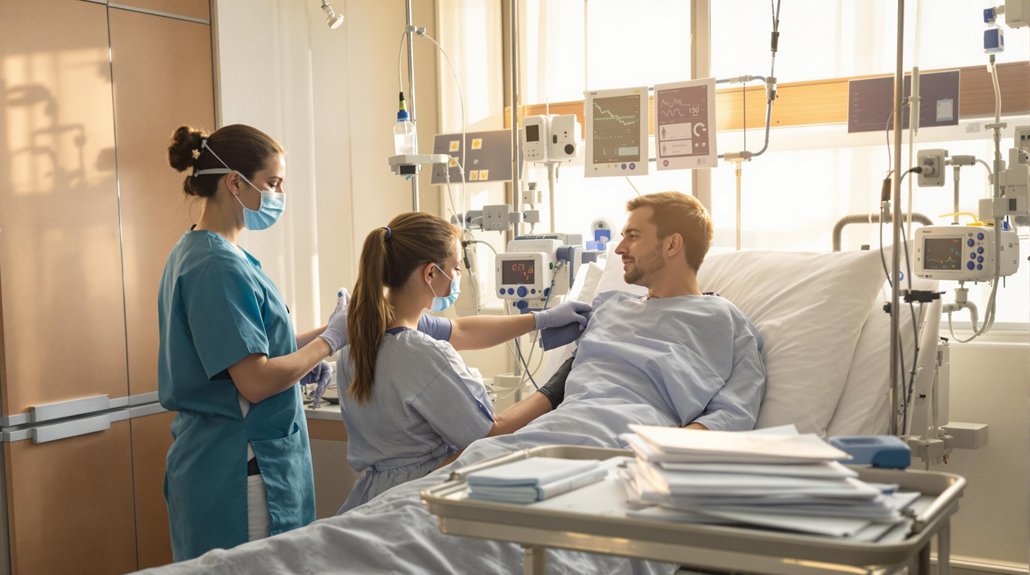No, perioperative care and PACU aren’t the same thing. Perioperative care covers your entire surgical journey, including before, during, and after surgery. PACU (Post-Anesthesia Care Unit) is just one specific part of perioperative care – it’s where you’ll recover immediately after surgery as you wake up from anesthesia. Think of perioperative care as the complete story, while PACU is an important chapter that focuses on your immediate post-surgery recovery. Understanding these differences can help you better prepare for your surgical experience.
Understanding Perioperative Care: A Comprehensive Overview
While many people confuse perioperative care with just the recovery room (PACU), perioperative care actually encompasses the entire surgical journey – from the initial decision for surgery through the complete recovery period.
As a healthcare provider, you’ll be involved in multiple phases of patient care, including the preoperative, intraoperative, and postoperative stages.
Your role begins with the perioperative assessment, where you’ll evaluate the patient’s health status and prepare them for surgery.
A comprehensive perioperative assessment sets the foundation for successful surgery by thoroughly evaluating patient health and readiness.
You’ll follow established surgical protocols to guarantee patient safety and ideal outcomes. During this thorough process, you’ll coordinate with various healthcare team members, manage documentation, and provide essential patient education.
Understanding the full scope of perioperative care helps you deliver better support to patients during this critical time in their healthcare journey.
Comprehensive post-operative support includes personalized management of pain, medications, and wound care to ensure proper healing and minimize complications.
What Exactly Is PACU? Key Components and Functions
The Post-Anesthesia Care Unit (PACU), often called the recovery room, serves as a specialized area where patients receive immediate care after surgery. You’ll find a controlled PACU environment designed to monitor and support patients as they emerge from anesthesia, guaranteeing their safe progression to consciousness. After PACU care, patients may require post-operative pain management and medication monitoring to ensure a smooth recovery.
| PACU Component | Primary Function |
|---|---|
| Monitoring Equipment | Tracks crucial signs and oxygen levels |
| Nursing Staff | Provides specialized post-operative care |
| Recovery Bays | Accommodates patients with privacy screens |
| Emergency Cart | Contains life-saving medications and tools |
| Documentation System | Records patient progress and essential data |
PACU protocols dictate strict standards for patient care, including frequent crucial sign checks, pain management, and airway monitoring. You’ll participate in a coordinated effort with healthcare professionals to prevent complications and guarantee superior recovery outcomes for your patients.
The Three Phases of Perioperative Care
Since perioperative care encompasses the entire surgical journey, it divides into three distinct phases: preoperative (before surgery), intraoperative (during surgery), and postoperative (after surgery).
In the preoperative phase, you’ll help prepare patients through preoperative assessments, medical evaluations, and patient education. During this time, you’ll gather crucial information and guarantee patients understand their procedures.
The intraoperative phase begins when patients enter the operating room and continues throughout the surgical procedure. You’ll focus on maintaining patient safety, monitoring essential signs, and assisting the surgical team.
The postoperative phase starts in the PACU and continues through postoperative recovery. You’ll monitor patients as they wake from anesthesia, manage pain, and watch for complications until they’re ready for discharge or transfer to another unit.
Skilled nursing care becomes essential during the postoperative phase to ensure proper wound care and reduce the risk of complications at home.
PACU’s Critical Role Within the Perioperative Process
Operating within the postoperative phase, PACU serves as a specialized recovery area where expert nurses vigilantly monitor patients emerging from anesthesia.
You’ll find that PACU protocols are specifically designed to guarantee patient safety during this vulnerable shift period.
As a PACU nurse, you’ll conduct thorough patient monitoring, checking essential signs, evaluating pain levels, and watching for post-surgical complications.
Your expertise helps detect early warning signs that could indicate potential problems. You’re responsible for managing pain medication, maintaining airways, and guaranteeing proper fluid balance.
PACU nurses blend clinical expertise with vigilant monitoring to identify complications early, manage medications effectively, and maintain critical patient stability post-surgery.
The PACU’s role is distinct from general perioperative care, as it focuses exclusively on immediate post-anesthesia recovery.
Your careful observation and quick response to changes in patient condition can make the difference between a smooth recovery and serious complications.
After PACU discharge, many patients benefit from recovery care services that provide personalized home care assistance during their continued healing process.
Staffing and Expertise: Differences Between Perioperative and PACU Teams
Professional roles in perioperative and PACU settings require distinct skill sets and specialized training, despite both teams working within surgical care.
While perioperative nurses focus on supporting surgeons during procedures, managing instruments, and maintaining sterile technique, PACU nurses specialize in post-anesthesia recovery and monitoring.
You’ll find that staff roles differ markedly between these units.
Perioperative teams include scrub nurses, circulating nurses, and surgical technologists who work together during active surgery.
PACU teams, however, concentrate on monitoring essential signs, managing pain, and evaluating patients as they emerge from anesthesia.
The specialized training for each area reflects these differences – perioperative staff must master sterile procedures and surgical assistance, while PACU personnel need expertise in critical care and emergency response during the recovery phase.
For healthcare facilities seeking to fill these specialized positions, Focus Family Care offers comprehensive staffing solutions for both perioperative and PACU departments.
Patient Journey: From Pre-op Through PACU Recovery
A patient’s surgical journey follows a carefully coordinated path that begins in pre-operative preparation and extends through PACU recovery. During your pre-op education, you’ll help patients understand what to expect, including fasting requirements, medication adjustments, and arrival times.
You’ll guide them through admission procedures and final surgical preparations.
Once surgery concludes, you’ll assist in transferring patients to the PACU, where specialized monitoring begins. In this critical phase, you’ll focus on pain management, essential sign stabilization, and emergence from anesthesia.
You’ll communicate recovery expectations clearly, helping patients understand normal post-surgical symptoms and milestones. Throughout their stay, you’ll monitor their progress until they meet discharge criteria, ensuring they’re ready to move either to their hospital room or head home with their caregivers.
Quality Metrics and Safety Standards in Both Settings
With patient safety at the forefront of perioperative and PACU care, healthcare facilities maintain strict quality metrics and standards to measure performance and outcomes.
Patient safety drives the rigorous standards and performance metrics that guide every aspect of perioperative and post-anesthesia care.
You’ll find thorough safety protocols in both settings that focus on preventing complications, reducing errors, and ensuring ideal patient care.
In perioperative areas, you’re required to follow specific quality improvement initiatives that track surgical site infections, medication accuracy, and team communication effectiveness.
Similarly, PACU standards monitor essential signs, pain management, and recovery milestones. You’ll need to document these metrics carefully and participate in regular audits to maintain compliance.
Both settings emphasize continuous monitoring of patient satisfaction scores, adverse events, and length of stay data to identify areas for improvement and implement evidence-based practices that enhance patient outcomes.
Bridging the Gap: How Perioperative Care and PACU Work Together
While distinct in their specific functions, perioperative care and PACU services maintain a seamless collaborative relationship that guarantees ideal patient outcomes throughout the surgical journey.
You’ll find that perioperative collaboration begins with the pre-surgical assessment and continues through PACU integration, creating a continuous chain of care. When you’re working in either setting, you’ll participate in detailed handoffs, share critical patient information, and coordinate care plans with your colleagues.
Through this integrated approach, you’ll make certain that your patients receive thorough care that addresses their needs before, during, and after surgery.
The success of your patient’s recovery depends on how well these two units work together, sharing expertise and maintaining clear communication channels throughout the entire surgical experience.
Conclusion
Perioperative care and PACU work together like teammates in a well-coordinated game. Think of PACU as one important player on the larger perioperative team. Just as a caring nurse holds your hand through recovery, these services support you every step of the way – before, during, and after surgery.
Picture a warm, safe space where skilled medical professionals watch over you like family, making sure you’re comfortable and healing well. You’re never alone in this journey. From the moment you prepare for surgery until you’re ready to head home, our dedicated team surrounds you with expert care and compassion.
Remember, your health and comfort are our top priorities. We understand that surgery can feel overwhelming, but you have an entire team of caring professionals by your side.
If you or a loved one need help, don’t wait. Reach out to Focus Family Care today at (561) 693-1311 or email us at info@focusfamilycare.com.




